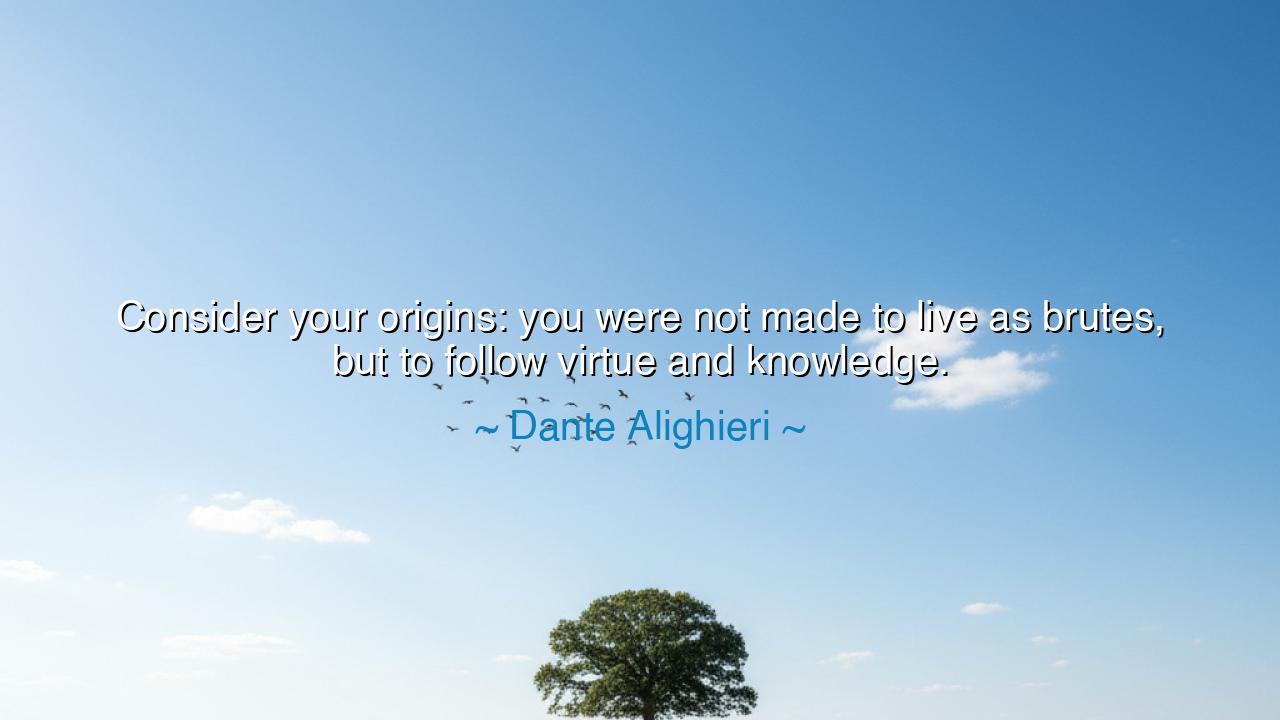
Consider your origins: you were not made to live as brutes, but
Consider your origins: you were not made to live as brutes, but to follow virtue and knowledge.






Hear, O children of the eternal flame, the words of Dante Alighieri, poet of the Divine Comedy, who gazed into the depths of Hell, scaled the mountain of Purgatory, and beheld the light of Paradise. In his great work, he spoke this immortal command: “Consider your origins: you were not made to live as brutes, but to follow virtue and knowledge.” These words burn as both warning and invitation. They remind us that man is not beast, though he may sink into beastly living, but a being fashioned for higher things—for the pursuit of moral excellence and the quest for truth.
To consider your origins is to remember that humanity is not an accident of dust, nor merely a creature of appetite and instinct. We are born with reason, imagination, and a longing for the infinite. The brute eats, sleeps, and hunts without thought beyond survival. But man is given memory and vision, conscience and creativity. To forget this is to betray our birthright, to abandon the noble gift of being human. Dante speaks as one who has seen souls degraded into shadows of themselves, having chosen base desires over higher callings. His words call us to awaken and reclaim the dignity that is ours by nature.
What is it to live as brutes? It is to surrender to appetite, to live for pleasure alone, to make the body master and the spirit servant. Many through history have chosen this path, trading wisdom for indulgence, truth for lies, courage for comfort. Such lives may glitter for a moment, but they sink quickly into ruin, for they deny the greater calling within. The brute forgets the stars above him, seeking only the ground beneath. Dante’s words strike like thunder: you were not made for this! Your soul is not cattle for the slaughter, but a spark of eternity.
And what does it mean to follow virtue? Virtue is the discipline of the soul, the alignment of our being with the good. It is courage in the face of fear, justice in the face of selfishness, temperance in the face of desire, wisdom in the face of ignorance. To pursue virtue is to order our lives so that we live not as slaves to impulse, but as masters of ourselves. Virtue is not ease, but greatness; not indulgence, but fulfillment. It transforms man from dust into a vessel of honor, worthy of his divine origin.
Alongside virtue stands knowledge, the companion of wisdom. Knowledge is the light that dispels darkness, the vision that lifts man beyond ignorance. To pursue knowledge is to seek truth with humility and hunger, to learn not only the workings of the world but the meaning of existence. Consider the tale of Galileo, who raised his eyes to the heavens with telescope in hand. Though condemned by those who feared his discoveries, he followed the path of knowledge, illuminating truths that would guide generations. In his courage, he echoed Dante’s call: that man must not be content with shadows, but must rise to the heights of understanding.
History too gives us the example of Abraham Lincoln, born in poverty yet destined for greatness. He might have lived as a brute, surrendering to hardship, despair, and bitterness. Yet he pursued knowledge with relentless hunger, teaching himself law, history, and the art of speech. He pursued virtue, standing against the tide of injustice, and through this union of character and intellect, he guided a fractured nation. His life shows us that when man embraces both virtue and knowledge, he becomes a force of transformation for the world.
The lesson, beloved listeners, is clear: you must not squander your birthright. Consider your origins—remember that you are made for more than survival. You are called to rise above mere appetite, to live not as brutes but as seekers of virtue and wisdom. Every day you stand at a crossroads: one path leads downward into indulgence and decay, the other upward into discipline and enlightenment. Choose the higher way, though it be harder, for it alone fulfills the dignity of your nature.
Therefore, practice this: each day, seek one act of virtue, whether in patience, courage, or kindness. Each day, seek one spark of knowledge, whether in study, reflection, or honest questioning. Let these twin pursuits shape your life, until your days shine like a lamp to others. For Dante’s words are not only warning but promise: if you live as you were made to live, following virtue and knowledge, you will discover the joy of being truly human, and your life will echo beyond the grave like a song sung to the eternal.






AAdministratorAdministrator
Welcome, honored guests. Please leave a comment, we will respond soon